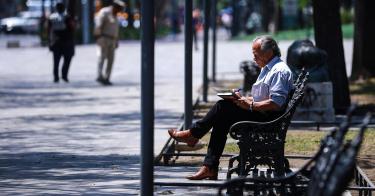After wreaking havoc across Europe, the Middle East and the U.S., China’s coronavirus landed in Latin America at end of February. Almost immediately, leaders in the region clamped down, closing borders, shutting down flights and instituting costly yet responsible social distancing procedures to prevent a dangerous outbreak.
That has not been the case with Mexico. While his regional neighbors with lesser resources and fewer confirmed cases have gone to great measures to safeguard public health, Mexican President Andres Manuel Lopez Obrador has naively dismissed the danger presented by this global pandemic.
The first cases of the virus were confirmed in Mexico on Feb. 28 when Mexican citizens returned from traveling in Italy. While countries like El Salvador closed off their borders even before they had a confirmed case, Mr. Lopez Obrador still waited to take serious action.
Instead, he nonchalantly attended large rallies with citizens where he hugged and kissed people. Just last week he was on national TV explaining how his amulets, honesty and refusal to be corrupted will protect him.
Without federal government leadership, state governors have been left to fend for themselves. Quintana Roo, the tourism-dependent state known for Cancun and Playa del Carmen, had 15 confirmed cases as of March 24. The governor there is pleading with bars, restaurants and other venues to shut down temporarily. (Meanwhile, in a video message Sunday, Mr. Lopez Obrador urged Mexicans to maintain the normal rhythm of their lives. “Don’t stop going out,” he said.)
But led by Mayor Claudia Sheinbaum, a political ally of Mr. Lopez Obrador, Mexico City’s government has replicated his naive approach. Not surprisingly, the capital city has become the epicenter of the country’s coronavirus outbreak. This is Mexico’s largest city and its most densely populated area, with the country’s busiest international airport, and thriving tourism, business, and cultural sectors—all factors that elevate its level of exposure. Surely, a preemptive plan to contain the inevitable was only prudent.
Yet only two weeks ago, the mayor permitted Mexico City to host Latin America’s largest music festival, featuring Guns N’ Roses. An estimated 70,000 tickets were sold for the weekend long event. Only after the concert did the mayor prohibit events greater than 1,000 people.
>>>Coronavirus Comes for Latin America
On Sunday, Ms. Scheinbaum finally made the big move, closing down non-essential businesses for the next month. But by that point, Mexico’s confirmed coronavirus cases had reached 316 confirmed and 793 suspected, with the majority in Mexico City.
The following day, the World Health Organization categorized Mexico as a country with community transition. Shortly thereafter, the Mexican federal government announced it would be moving into phase two of its plan to combat the coronavirus.
The U.S. and other regional neighbors should be concerned about Mr. Lopez Obrador’s insufficient response. Phase two consists of a paltry $180 million for the ministry of defense to support hospitalizations, a ban on gatherings of 100 people or more, and sending health-care workers around the country. The Tuesday announcement include no relief for workers losing their jobs or loans for businesses losing productivity. Nor was there a plan to address the collapse of the Mexican peso, which has declined to a record low against the U.S. dollar amidst the global pandemic.
What happens in Mexico will inevitably impact the U.S. America needs to evaluate and shore up its own vulnerabilities. Land borders are only one point of entry for travelers. The Trump administration took care of temporarily limiting border activity, but further steps should be considered.
Numbers are relatively low in Mexico for the time being, but community spread is inevitable. If this occurs, the Trump administration would be wise to consider temporarily banning flights and conducting additional screening measures for travelers coming through Mexico. The U.S. cannot afford additional cases in the midst of our own crisis.
This piece originally appeared in The Washington Times



